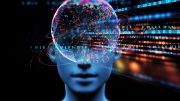The UK government has announced plans to invest millions of pounds of government funding to develop AI that is able to diagnose cancer and chronic disease before symptoms have developed, potentially saving 20,000 lives each year.
AI is increasingly being heralded as a technology to achieve further breakthroughs in the sector – including the potential to detect cancer.
Faced with a growing population and tight budget, the UK’s National Health Service has already started looking to AI to improve patient service and cut costs. With smartphones due to become the primary method of accessing health services, the NHS is already investing in AI-powered apps and implementing technology which will allow NHS 111 enquiries to be handled by robots within two years.
Yet recent research by OpenText has revealed widespread uncertainty amongst the UK population when it comes to trusting their health to AI:
- A more accurate diagnosis was identified as the biggest benefit of introducing AI into healthcare, yet only a quarter (26%) of UK consumers believe robots would reach the correct diagnosis
- Speed and quick access were also highlighted as major benefits – 21% believe AI technology can offer a quick diagnosis and the same proportion (21%) would appreciate not having to take time off work to visit a doctor
- One in five (21%) British citizens think that Brexit will impact the UK’s ability to innovate in the area of artificial intelligence
As AI is implemented across the healthcare sector, British consumers will need to put their trust in this technology. Yet this research revealed that two fifths (41%) do not know if they would trust the medical diagnosis given by AI and a further 26% confirmed that they did not trust the technology. Just 11% said they would trust the diagnosis of AI more, or just as much, as a doctor’s diagnosis.
Commenting on these findings, Mark Bridger, VP of OpenText said: “Artificial intelligence and cognitive technologies have the potential to completely transform healthcare services. While sci-fi films can distort the impact of AI technology, it’s time to stop viewing AI as an existential threat to our livelihoods and our health. AI will transform the workplace as menial tasks, and some non-routine jobs, are digitalised through robotics and process automation but it cannot replace people. The true value of AI will be found in it working alongside humans to ease the pressure across the healthcare system as well as making our lives easier. By implementing AI when tapping into the vast volumes of data available to them, healthcare organisations can gain access to real-time information and sophisticated insights – empowering them to improve decision-making and deliver services that really do meet the needs and wants of UK citizens.”
Theresa May has challenged health charities, the NHS and the artificial intelligence (AI) sector to pool data in order to transform the diagnosis of chronic diseases. Medical records, along with information about patients’ habits and genetics, will be cross-referenced with national data to spot those at an early stage of cancer.
Jackie Hunter the CEO of BenevolentBio, the UK’s leading private artificial intelligence company in healthcare. “AI has the potential to revolutionise all aspects of healthcare – not only in delivery and early diagnosis of disease but also in the ability to find new medicines and ensure they are delivered to the right patients. It is also important that the UK maximises its human capital and ensures that all students have the ability to study data science and its applications in a range of areas including healthcare.”
Reacting to Prime Minister Theresa May’s comments on Monday, in which she calls for an artificial intelligence industry in healthcare to help tackle late diagnosis of otherwise treatable illnesses, Jane Rendall, Managing Director of NHS imaging technology partner Sectra UK & Ireland, said:
“The NHS has practically unused archives of millions of diagnostic images that could become one of the most powerful clinical datasets in the world if artificial intelligence is used effectively. Our health service has a wealth of imaging data that it can use to start teaching machines how to recognise parts of the human anatomy, and more importantly, how to recognise abnormalities.”
“As more and more diagnostic disciplines digitise, imaging collected has huge potential to go from being largely unused storage boxes to goldmines of clinical knowledge. Machines can act as a powerful decision support system, but more than that they could be programmed to proactively suggest other conditions that they have been taught to recognise.”
“AI cannot replace the human in the diagnostic process, but it can enable automation of mundane tasks to better support radiologists and pathologists, enabling the most urgent studies to be reviewed first and allowing specialist staff to be alerted to the more complex cases that require their attention. It is reassuring to see commitment from Theresa May to this crucial area, that could do so much to reduce the ever growing pressure on NHS diagnostic departments.”





